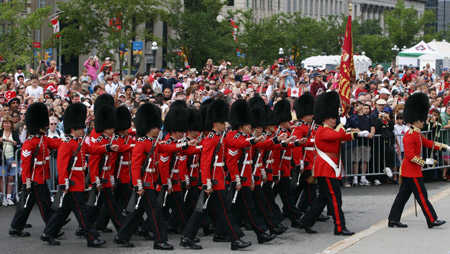The forthcoming 2010 Vancouver Winter Olympics also featured in the celebration, as the country's top athletes were introduced on the stage and the mascots of the games greeted the audience.

|
|
Canada's Governor General's Foot Guards march during Canada Day celebrations on Parliament Hill in Ottawa, capital of Canada, July 1, 2009. Canadians celebrated their country's 142nd birthday on Wednesday. [Xinhua]
|
The festivities were capped off with a thunderous fireworks display at 10 p.m. local time (0300 Thursday GMT).
Formerly known as "Dominion Day," July 1 is a Canadian statutory holiday celebrating the anniversary of the 1867 enactment of the "British North America Act," which first established the single country of Canada by uniting four provinces in nowadays eastern Canada. The name was officially changed to "Canada Day" in 1982 when the British "Constitution Act" patriated the Canadian constitution.
But as early Canadians thought themselves primarily to be Britishers, it was not until 1967 when Canada really matured into a distinct, independent country that "Canada Day" began to dominate the country's calendar.
Blessed with a vast land and abundant natural resources, Canadians are immensely proud of their country. A recent Strategic Counsel survey showed 90 percent of Canadian respondents agreed with the statement that "Canada is the best country in the world."
About 36 percent of the respondents also put multi-culturalism as one of the country's most representative symbols, only after hockey (48 percent).

|
|
A child waves Canada's flag during Canada Day celebrations on Parliament Hill in Ottawa, capital of Canada, July 1, 2009. Canadians celebrated their country's 142nd birthday on Wednesday. [Xinhua]
|
Undoubtedly, with the influx of immigrants in recent years, the makeup of the Canadian mosaic, now 33 million people strong, has changed considerably over the years.
While two decades ago, the average Canadian was, in his or her late twenties, less likely to be in a relationship with someone of a different ethnic origin and new immigrants were more likely to be of European background. Nowadays, the average Canadian is 39 years old, more likely to be married to someone of a different ethnicity and new immigrants are more likely to be from Asia or the Middle East.
According to Statistics Canada's 2006 census, 20 percent of the country's population was foreign-born, the highest percentage since 1931. In 2006, 58 percent of new immigrants were from Asia or the Middle East, and only 16 percent arrived from Europe, down dramatically from 61 percent in 1971.
But the country is also challenged by an increasingly aging population and the declining of the rural communities. Because two-thirds of Canada's population growth come from immigration and not new births, the country's median age has risen to 39 from 26 in 1971, becoming one of the oldest societies in the world.